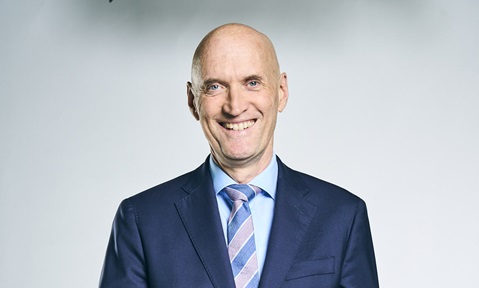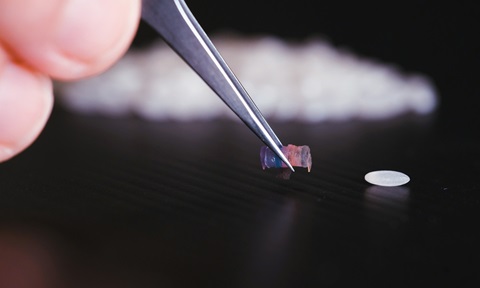The doctor's digital detective
Powering the future of healthcare with artificial intelligence

With the ability to process large datasets, detect patterns and make accurate predictions at top-notch speeds, artificial intelligence (AI) tools are helping healthcare workers spot clinically relevant cues that might otherwise fly under the radar.
Across NTU’s vibrant campus, several research teams are developing novel AI technologies to help physicians deliver more effective care.
Does this look suspicious?
Cancer is among the top 10 leading causes of death globally. Detecting the disease before it spreads uncontrollably is crucial for its effective treatment.
Colorectal cancer, for example, often starts inconspicuously as clumps of cells growing in the gut called adenomas. Although they are non-cancerous, adenomas can develop into life-threatening tumours. To combat this highly prevalent cancer on a worldwide scale, NTU is teaming up with universities and hospitals in Hong Kong and China to develop a novel screening method integrating AI algorithms.
In a trial, the researchers found that compared to conventional colonoscopy, the AI-assisted screening approach significantly enhanced adenoma detection and characterisation in an asymptomatic population.
“In previous studies, AI-assisted colonoscopy only improved detection of small adenomas, but in our case, the whole spectrum of adenomas could be detected more easily,” explains Prof Joseph Sung, Dean of NTU’s Lee Kong Chian School of Medicine (LKCMedicine).
Skin cancer is one of the most common cancers but it is difficult to distinguish skin cancer from other lesions. Backed by advances in AI, computer-aided diagnosis can help disentangle these different skin diseases by analysing images of the skin surface.
However, high detection accuracy often comes at the cost of high computing power.
To create a diagnostic tool that can be used on portable devices and in low-resource settings, researchers led by Prof Miao Chun Yan, President’s Chair in Computer Science and Chair of NTU’s School of Computer Science and Engineering (SCSE), are harnessing an AI method called Self-Supervised Diverse Knowledge Distillation that can efficiently process rich datasets even on devices with limited computing resources.
When tested against a large database of over 25,000 images, their novel framework correctly classified eight different skin diseases and achieved an accuracy rate of 85%.
Similarly, spotting the early warning signs of glaucoma can help doctors initiate interventions that delay or prevent significant vision loss caused by the disease. But even trained experts may inconsistently diagnose glaucoma from photos of the optic disc, a region in the eye typically disrupted in glaucoma.
Assoc Prof Wang Lipo from NTU’s School of Electrical and Electronic Engineering and collaborators have devised an automatic network that locates the optic disc and detects abnormalities without needing extensive data labelling.
Equipped with an attention-based mechanism, its deep learning method can immediately focus on the optic disc while retaining global information about other eye regions – ultimately leading to greater prediction performance.
Lending a helping robotic hand
In Traditional Chinese Medicine, a massage called Tuina is used to alleviate lower back pain.
But skilled massage therapists are in short supply, making automated inventions an appealing addition to the healthcare force. “Effective and affordable long-term care for pain management is an essential healthcare need in every country,” says Assoc Prof Linda Zhong, Director of Biomedical Sciences and Chinese Medicine at NTU’s School of Biological Sciences.
AiTreat, a startup incubated by NTU, aims to meet this need through its flagship robotic product: Expert Manipulative Massage Automation (EMMA). The team developed an AI training model to build up the robot’s analytical capabilities, allowing it to recognise patients’ physical status and plan appropriate movements to perform the massage treatment.
EMMA is now set to undergo trials co-led by Assoc Prof Zhong to evaluate the technology’s effectiveness compared to manual Tuina. “EMMA can become a pioneering application to redefine how therapeutic massages are delivered,” Assoc Prof Zhong highlights.
Meanwhile, researchers from NTU and Singapore’s Tan Tock Seng Hospital have designed a wearable robot to aid people with limited mobility to live more independently. The Mobile Robot Balance Assistant (MRBA), handily dubbed “Mr Ba”, is equipped with AI algorithms that process sensor-captured data about a user’s movements and directs the robot to adapt and follow the person in real time.
As a rehabilitation companion, MRBA provides balance support to enhance patient mobility and can even catch people on the verge of falling. Assoc Prof Ang Wei Tech, Executive Director of the Rehabilitation Research Institute of Singapore, who supervised the development of the project, envisions that data-driven assistive robots like MRBA will empower people like the elderly to move with confidence and elevate their overall wellbeing.
“As every disability is different, a human-robot interface must be intelligent, intuitive and safe to cater to diverse users who have varying physical, sensory and cognitive abilities,” says Assoc Prof Ang, who is from NTU’s School of Mechanical and Aerospace Engineering.
Taking a holistic approach
Mental wellbeing is equally important for a good quality of life.
Effective treatment of dementia hinges on its early and accurate detection. NTU has launched the Dementia Research Centre (Singapore) to study dementia in Asians. Headed by senior consultant neurologist Assoc Prof Nagaendran Kandiah of NTU’s medical school, the centre is developing AI-powered strategies to identify features in the brain associated with early dementia, facilitating prediction of the condition to delay its progression.
The University has also launched the Centre for Biomedical Informatics, led by Asst Prof Bernett Lee and Asst Prof Wilson Goh of NTU’s LKCMedicine, to provide bioinformatics, data science and AI-based solutions that accelerate biomedical and health research.
A project at the centre co-led by Asst Prof Goh is using AI to identify genetic and metabolic markers linked to the onset of schizophrenia.
For Assoc Prof Georgios Christopoulos of NTU’s Nanyang Business School and LKCMedicine’s Prof Josip Car, AI techniques have been invaluable when finding links between behaviour captured by fitness trackers and depressive symptoms, leading to a programme that can detect individuals at high risk of depression with 80% accuracy.
Assoc Prof Christopoulos is also developing AI algorithms and sensors that can measure and predict mental fatigue from vital signs such as heart rate.
According to Prof Sung, integrating these powerful AI innovations into the healthcare system is not just about proving their effectiveness; it also requires building trust and ensuring safety.
“We would like to see partnerships between human doctors and AI tools,” shares Prof Sung. “If humans and machines work together – with the doctor making the final decision – then both doctors and patients will be more comfortable with accepting AI in medicine.”
The article appeared first in NTU's research and innovation magazine Pushing Frontiers (issue #22, August 2023).

-and-dr-dorrain-low-from-ntu-singapore's-lkcmedicine.tmb-listing.jpg?Culture=en&sfvrsn=b389b500_1)
.tmb-listing.jpg?Culture=en&sfvrsn=82921582_1)


.tmb-listing.jpg?Culture=en&sfvrsn=ba129532_1)
